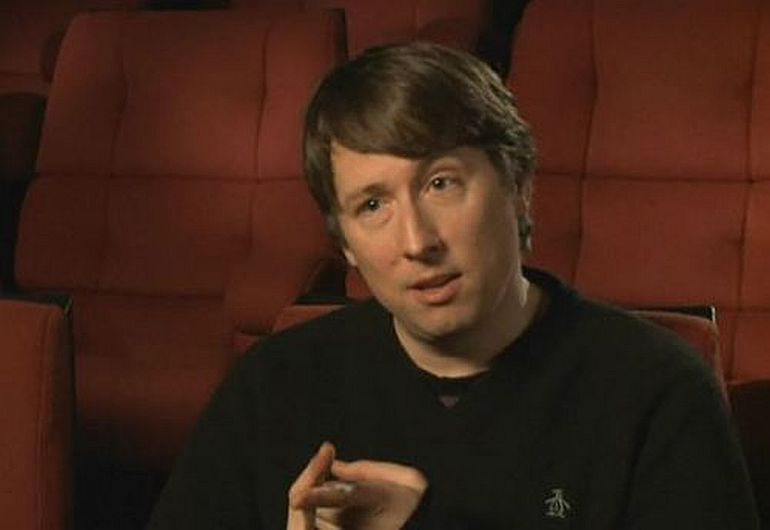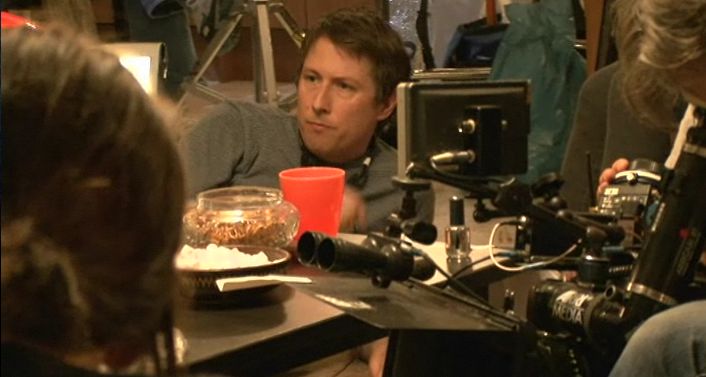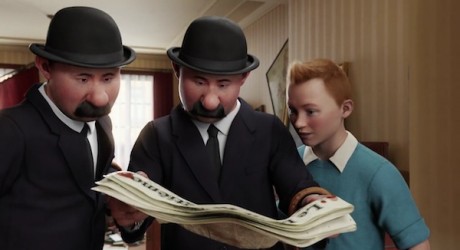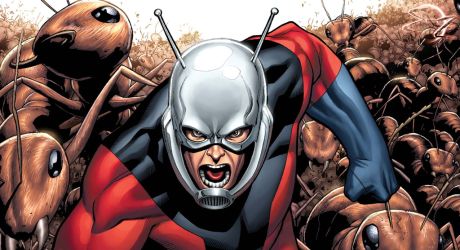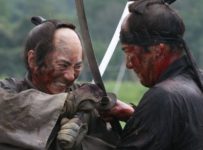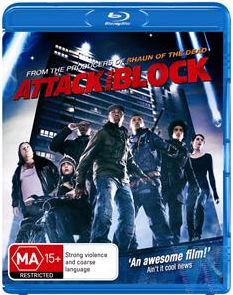 To celebrate the release of Attack the Block on DVD and Blu-ray in Australia, available from Icon on 4 April 2012, we were given the opportunity to talk with the writer/director Joe Cornish on the making of his wonderful spin on the alien invasion genre.
To celebrate the release of Attack the Block on DVD and Blu-ray in Australia, available from Icon on 4 April 2012, we were given the opportunity to talk with the writer/director Joe Cornish on the making of his wonderful spin on the alien invasion genre.
Despite some technical difficulties, necessitating me to talk (in the words of Cornish) as though I was speaking to “a very far away child”, we had a thorough conversation covering his current and upcoming projects. He generously spoke at length on the production of Attack the Block, his involvement in the screenwriting process for The Adventures of Tintin with Steven Moffat and Edgar Wright, and we naturally asked him about his Ant-Man project with Edgar Wright for Marvel.
We need to thank Icon for the opportunity to talk to the writer/director, and of course Mr. Cornish for his time.
Attack the Block is available on DVD and Blu-ray in Australia on 4 April 2012 from Icon.
How long had the idea of the film been gestating in your mind?
Quite a while, quite a few years. Probably since I had a kind of mugging incident with a group of kids, not dissimilar to how the film begins. That was a a while ago, that was like maybe even 10 years ago now. The idea’s been bubbling in my head.
When did the decision happen to make that into a feature film, following on from your television career, and why Attack the Block?
I’d always wanted to make films, since I was a kid, and I went to film school when I was 18. I trained as a director for three years, if you can call it that. I ended up doing TV comedy, there’s a lot of directing in that…You know, I was always practicing writing screenplays and stuff, and I guess I just felt it was a doable idea and it was maybe a cool fit to have a go at. it felt like the right idea. I guess I was old enough and had enough contact in film and television to realistically get it done.
Was it a struggle to get any of the film financing up for Attack the Block?
It was really financed by Film Four, and a company called Optimum and this guy called Will Clark who is a very important guy in the British film industry. He just liked the idea and he funded most of it through Optimum. Then Film Four and the Film Council came in as well. The other thing to say is I’m the director of the film and not the producer, so Nira Park and everyone at Big Talk did amazing work raising the money. So they made it seem very easy to me. I just got on with pre-production and storyboarding and it magically happened. They all worked very hard to raise the money I think.
From your point of view, was there much compromised between your original vision and what we end up seeing on screen, or was that pretty much what you always imagined it to be?
I don’t think there was too much compromising. We had to cut some sequences out, it was going to get a lot bigger at the end. There was a whole other chase sequence, it was going to be a little bit longer. In fact, you can see one of the extras on the DVD talks you through the missing bits. But I feel really to have got to make it, I’m really happy with the production values. So yeah, I can’t complain at all.
The casting process itself, the core guys in the film are all fantastic – well, everyone in the film is fantastic. Did they come fully-formed or did you have to work with them a lot to get that very particular vision of South London you were going for?
Well they were all kids who had shown talent for acting, either in school or in youth theatre. So they all put a lot of effort into their characters and I was very collaborative with them. We let them contribute to the costumes and the set design. I wrote the last couple of drafts of the script after they’d been cast, so they were able to tweak all their dialogue and make sure they were totally comfortable with everything. You know, as young people growing up in London, which all of them are, they all know something about that world. They’re not necessarily from it, but they all know something about it. So it was a combination of their skill, and talent and my skill and talent. [Laughs]
How tightly scripted was the film, and how much did the actors come up during the shoot?
We pretty much stuck to the script when we shot, but as I say, the actors tweaked the dialogue in the final script stages, so again that was kind of a collaboration. I spent a long time researching and talked to hundreds of kids from the world, or the kind of world, the film is set in. So I put a lot of effort into trying to get the slang right. It’s a bit exaggerated, it’s a bit more full on than it might be in reality, to give it that kind of cartoony, larger-than-life thing. The kids were an amazing resource all the way through. We basically sought their approval for everything that we could.
The other major characters are the creatures themselves. The design was a staggeringly frightening one, as well as being quite iconic as a new alien. Did that design come before anything else?
That came as I was writing really. I had a friend who is a cartoonist, and I had him do little sketches of stuff as we went along. So we thought of the design as we went along. But I always had that idea it was a silhouette, because I kind of got that idea from my cat. I’ve got a black cat, and she always looks like a silhouette when lit in a particular way, or when you scrunch her eyes up. So from the beginning I thought it would be good to have a monster who was a pure shadow, who was a pure silhouette.
This is of course on the eve of the Australian DVD/Blu-ray release, and the film has a very particular South London vibe to it. What universal themes do you hope emerge from Attack the Block?
Well, I hope people just really enjoy it. It’s a crazy, stupid, action-adventure movie. Also it’s about the very young people in it, and how much potential they have, and how much energy they have, and if you don’t take care of them, that energy can go wrong, like you see at the start of the film. But its also possible for them to be heroes and contribute to the world and do something positive and altruistic. So the film is trying to show you that both of those things are possible with young people, and it’s up to them and to the world to care about them and make sure things have a happy ending. That make sense?
That makes perfect sense to me. The other thing I like about the film is that it appears to be a tribute to a lot of cinema, but it’s not a pastiche or a parody, so I’m interested in what your cinematic influences were in putting together the look and feel of that world.
It was particularly John Carpenter and Walter Hill, a cinematographer called Andrew Laszlo. It was kind of influenced by the first movies of directors I really dig. But I think the fact that it was all at night, it’s a gang movie, meant that we referred to Walter Hill stuff a lot. Particularly Streets of Fire and The Warriors, Carpenter’s stuff a lot, particularly [Assault on] Precinct 13, and then other gang movies like The Outsiders and Rumble Fish. So lots of stuff. I’m quite old, I was 41 when I made the film, so that’s quite a lot years of movie watching.
I’m not far behind. I did see a lot of that in there, and it was good to know they are influences. The other thing I’ve read recently is that you’ve apparently been approached for sequel, remake or TV ideas. Is that that still on the cards?
Oh, for Attack the Block? I don’t think so. Certainly not soon. I want to try and do something a bit different next. It’s always flattering and cool to be asked, and lots of fun to think about how the story could continue. It’s fun to think about, fun to speculate but there’s no serious plan.
Leading off projects coming up, one other interesting collaboration you’ve had for a few years is with Edgar Wright. How did you get involved in [The Adventures of] Tintin film? Was that through Edgar Wright?
Yeah, that’s most definitely through Edgar. I’ve known him since I was probably about 26 and 27. I had a TV comedy on British television about the same time as Edgar’s program Spaced. So we’ve been friends since then. He’s been an amazing friend to me. We worked on this screenplay together for Marvel that’s still unproduced called Ant-Man…
I was leading up to asking you about Ant-Man.
There you go. So when the opportunity to work on Tintin came up, I’m pleased to say he thought of me.
So the collaborative process on Tintin. How did that work? I’m interested in how your three very distinct styles came together.
Well, that movie was a very big collaboration. You know, Steven Spielberg and Peter Jackson are both massive fans, so they had very strong ideas. Steven Moffat was the first to do a draft, and he’s obviously an incredibly writer. And then Edgar and I did a few drafts together. So there was a lot of input from the amazing animators at WETA. On a movie that big and that complicated, the ideas are coming in from all over the place, really. Both Spielberg and Jackson are very, very collaborative, and your job as a writer is to sort of corral as much of it to contribute as an author. So it was a process, it was amazing. It was amazing to work with those people, and amazing seeing how that kind of thing gets made.
I know you’re not involved in the next one, but have you been approached at all for future Tintin films?
I think…No.
Would you be interested?
Yeah, of course. I love Tintin. We worked very long and hard on that one, so its good to have a bit of a break and let some probably even more brilliant people have a go at it and do the next one.
Did you find the end product of Tintin matched the pictures in your head. It’s obviously a very long process with a film like that between script and screen.
Yeah, I think it’s a really a good, old-fashioned, rollicking adventure movie. I think what Spielberg does with the camera in it is incredibly. I think the physical performances in it are incredible, the animation is amazing. I think it is a really rich take on Tintin.
You mentioned it before, and I have to ask as a massive comic book fan, the Ant-Man project. Is that still moving along?
That’s a question you’d have to ask Edgar and Marvel. I’m a mere writer. We’re both really proud of our script and think it’s really good.
If I ever get a chance to talk to Edgar or Marvel, I’ll certainly ask them. Just out of curiosity, I’m just interested in what your take was. Was it comedic or more of a straight take?
I just wouldn’t want to spoil the surprise. So I’m not going to talk about it in any more detail. Sorry not to play ball, but it’s more exciting to keep it a mystery.
Not at all. You understand, I had to ask. [Laughs]
Of course, you’re just doing your job.
You did mention you were looking for the next exciting project. Have you got anything on the boil at the moment?
Yeah, I’m working on a few things. Once again I’m going to be a bad interviewee and a poor supplier of tidbits, and not tell you anything. Everything is in fairly early days. Everything is too embryonic to be exposed to the cold light of day.
There’s far too many spoilers on the Internet, as it is at the moment, I think. It’s nice to have a bit of mystery around upcoming films.
Yeah, that’s good of you to say. I appreciate that. [Laughs]
Thank you so much for your time!

